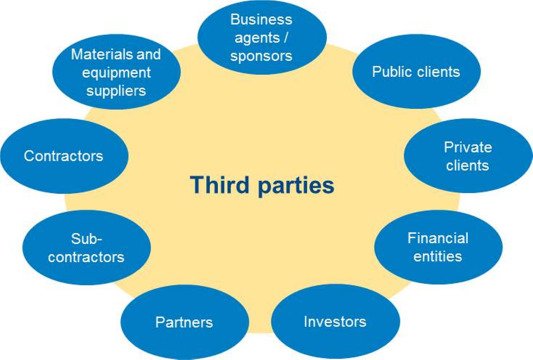Third Party Vendors Integration: How External Partners Can Transform Your Business Operations


Running a business today means juggling countless responsibilities, from product development to customer service. But here's the thing, you don't have to do it all in-house. Enter third party vendors: the unsung heroes that can transform your business operations while you focus on what you do best.
What Are Third Party Vendors?
Third party vendors are external companies or service providers that offer specialized services, products, or expertise to your business. Think of them as your business's extended team – professionals who aren't on your payroll but play crucial roles in keeping your operations running smoothly.
Unlike employees or internal departments, these vendors operate independently and typically serve multiple clients. They bring their own tools, expertise, and systems to the table, allowing you to tap into specialized knowledge without the overhead costs of building these capabilities internally.
The Essential Role of Third Party Vendors in Modern Business
Third party vendors have become the backbone of successful businesses across industries. They fill critical gaps in your organization's capabilities, bringing several key advantages to the table.

Specialized Expertise at Your Fingertips When you partner with third party vendors, you're essentially hiring specialists who eat, sleep, and breathe their particular field. Whether it's cybersecurity, digital marketing, or logistics, these vendors have dedicated their entire business model to mastering one area. This level of specialization often surpasses what you could develop internally, even with significant investment.
Cost-Effective Operations Building internal capabilities for every business function can be prohibitively expensive. Third party vendors allow you to access high-level services without the costs of hiring full-time employees, purchasing equipment, or developing internal processes from scratch. You pay for the service you need, when you need it.
Scalability and Flexibility Your business needs fluctuate throughout the year. Third party vendors provide the flexibility to scale services up during busy periods or down during slower times. This adaptability is particularly valuable for seasonal businesses or companies experiencing rapid growth.
Risk Distribution By outsourcing certain functions to specialized vendors, you're also distributing risk. These vendors often carry their own insurance, have backup systems in place, and assume responsibility for their area of expertise. This can significantly reduce your business's overall risk profile.
How Third Party Vendors Impact Your Business
The influence of third party vendors extends far beyond simple cost savings. They can fundamentally reshape how your business operates and competes in the marketplace.
Enhanced Focus on Core Competencies When you're not worried about managing IT infrastructure or handling payroll processing, you can dedicate more time and resources to what makes your business unique. This enhanced focus often leads to better products, improved customer experiences, and stronger competitive positioning.
Access to Cutting-Edge Technology Staying current with technology can be expensive and time-consuming. Third party vendors invest heavily in the latest tools and technologies because it's their competitive advantage. By partnering with them, you gain access to enterprise-level solutions that might otherwise be out of reach.
Improved Operational Efficiency Vendors who specialize in specific functions often operate more efficiently than internal teams handling multiple responsibilities. Their focused expertise and dedicated processes can streamline operations and reduce the time required to complete various tasks.
Enhanced Competitive Advantage The right third party partnerships can give you capabilities that set you apart from competitors. Whether it's faster shipping through logistics partners or better customer insights through analytics vendors, these relationships can become a source of competitive differentiation.
Potential Challenges to Consider While the benefits are significant, third party vendor relationships also introduce some considerations. You'll need to manage vendor relationships carefully, ensure data security and privacy compliance, and maintain quality control across external partnerships. Communication and alignment become crucial when your success depends on external parties.
Types of Third Party Vendors: Building Your Business Ecosystem
Understanding third party vendors becomes clearer when you see them in action across different industries and business functions.
Technology and IT Services Amazon Web Services (AWS) exemplifies how third party vendors can transform business operations. Instead of building and maintaining their own server infrastructure, companies like Netflix and Airbnb rely on AWS for their computing needs. This partnership allows them to focus on content creation and user experience while AWS handles the complex technical infrastructure.
Payment Processing Stripe and PayPal have revolutionized how businesses handle online transactions. Rather than developing their own payment systems and navigating complex financial regulations, e-commerce companies integrate these third party solutions to accept payments securely and efficiently.
Customer Relationship Management Salesforce serves as the customer relationship management backbone for countless businesses. Companies use this third party platform to manage sales pipelines, track customer interactions, and analyze performance metrics without developing these capabilities internally.
Logistics and Fulfillment FedEx and UPS don't just deliver packages – they provide comprehensive logistics solutions. Many businesses rely on these vendors for warehousing, inventory management, and distribution, allowing them to reach customers worldwide without building their own logistics networks.
Marketing and Advertising Digital marketing agencies like HubSpot and Mailchimp enable businesses to execute sophisticated marketing campaigns without hiring full marketing teams. These vendors provide everything from email marketing automation to comprehensive analytics and reporting.
Financial Services QuickBooks and similar accounting software companies handle bookkeeping and financial management for millions of small businesses. Rather than hiring full-time accountants, many businesses use these third party solutions to manage their finances efficiently.
Human Resources Companies like ADP and Paychex manage payroll, benefits administration, and compliance for businesses of all sizes. This allows companies to provide comprehensive HR services to their employees without building internal HR departments.
Choosing the Right Third Party Vendors for Your Business
Selecting the right vendors can make or break your business operations. The key is finding partners whose capabilities align with your needs and whose values match your business culture.
Assess Your Business Needs Start by identifying areas where you lack expertise or where costs are becoming prohibitive. Look for functions that aren't core to your competitive advantage but are essential for operations. These are prime candidates for third party vendor partnerships.
Evaluate Vendor Capabilities Don't just look at what vendors can do today – consider their roadmap for the future. The best vendor relationships are partnerships that grow and evolve with your business. Examine their track record, client testimonials, and ability to scale their services.
Consider Integration Requirements Your chosen vendors need to work well with your existing systems and processes. Evaluate how easily their solutions integrate with your current technology stack and whether they can adapt to your specific workflow requirements.
Understand the Total Cost of Ownership Look beyond the initial price tag to understand the full cost of the vendor relationship. This includes implementation costs, training requirements, ongoing management time, and potential switching costs if you need to change vendors in the future.
Plan for Vendor Management Successful third party vendor relationships require active management. Establish clear communication channels, set performance expectations, and create regular review processes to ensure the relationship continues to deliver value over time.
The Future of Third Party Vendor Relationships
The landscape of third party vendors continues to evolve rapidly, driven by technological advancement and changing business needs. Artificial intelligence and machine learning are enabling vendors to provide more sophisticated services at lower costs. Cloud computing has made it easier for small vendors to compete with larger established players by reducing infrastructure requirements.
We're also seeing increased specialization among vendors, with many focusing on very specific niches or industry verticals. This trend allows businesses to find vendors with deep expertise in their particular sector or use case.
The rise of platform-based vendors is another significant trend. Rather than providing single-point solutions, many vendors now offer comprehensive platforms that integrate multiple services. This can simplify vendor management while providing more cohesive solutions.
Conclusion
Success with third party vendors requires thoughtful planning and active management. Start small with non-critical functions to build confidence and learn how to manage vendor relationships effectively. As you become more comfortable, you can expand to more critical business functions.
Communication is absolutely crucial in vendor relationships. Establish clear expectations, regular check-ins, and escalation procedures from the beginning. Many vendor relationship challenges stem from misaligned expectations or poor communication.
Finally, remember that the best vendor relationships are true partnerships. Look for vendors who are invested in your success and willing to adapt their services to meet your evolving needs. These partnerships can become significant competitive advantages that drive long-term business growth.
Third party vendors represent one of the most powerful tools available to modern businesses. By leveraging external expertise and capabilities, you can build a more efficient, scalable, and competitive organization while focusing your internal resources on what matters most to your customers and your bottom line.
Ready to strengthen your vendor compliance program? Contact our experts today to learn more.